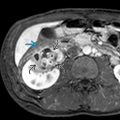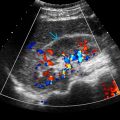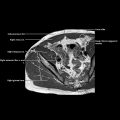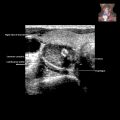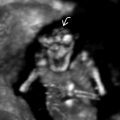KEY FACTS
Terminology
- •
Ventricular septal defects (VSD) classified according to location
- ○
Membranous: Defect in outflow tract of left ventricle, immediately below aortic valve
- ○
Muscular: Defect in muscular portion of septum, anywhere from cardiac apex to base
- ○
Outlet: Defect in outflow tract of right ventricle, below pulmonary valve
- ○
Inlet: Located posterior and inferior to membranous septum, beneath septal leaflet of tricuspid valve
- ○
Imaging
- •
Small muscular ventricular septal defects may not be visible on grayscale or color Doppler
Top Differential Diagnoses
- •
Atrioventricular septal defect
- ○
Large VASD as well as VSD
- ○
Missing crux (middle) of heart
- ○
Single atrioventricular valve
- ○
Scanning Tips
- •
Signal dropout at membranous-muscular junction of septum potential pitfall
- ○
Try to image perpendicular to ventricular septum
- ○
- •
Look for echogenic dot at edge of defect
- ○
Normally no echo at site of transition from muscular to membranous septum
- ○
- •
Confirm on long-axis view if seen on apical 4-chamber view and vice versa
- •
Look for septal continuity with aortic annulus in left ventricular outflow tract view to exclude membranous VSD
- •
Use color Doppler to confirm blood flow across defect
- •
Obtain dedicated fetal echo
- ○
Associated cardiac abnormalities present in 50%
- ○
 .
.


